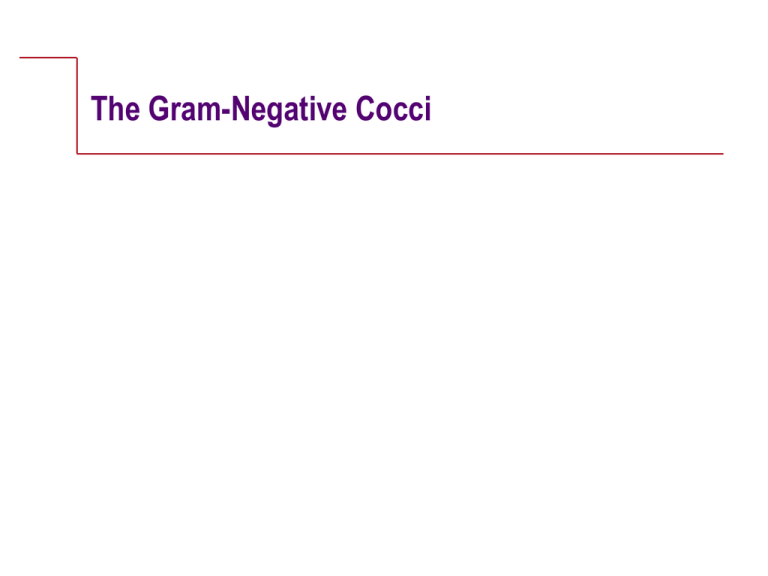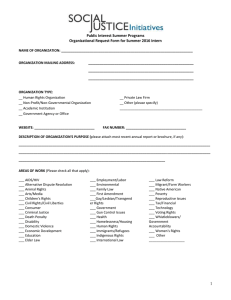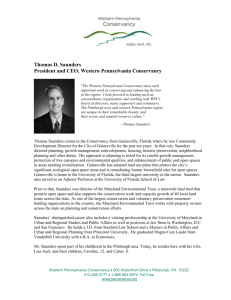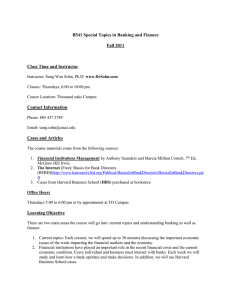The Gram-Negative Cocci
advertisement

The Gram-Negative Cocci Case Study A 20-year-old female college student complained of a low-grade fever and pain, redness, and swelling of several of her joints Aspirates from both ankles and an elbow showed many PMNs and gram-negative intracellular and extracellular diplococci Cultures on Thayer-Martin and MacConkey agar failed to produce growth after 5 days of incubation W.B. Saunders Company items and derived items copyright © 2001 by W.B. Saunders Company. Points to Consider What special growth requirements should be available to these organisms to be recovered from clinical samples? What virulence factors do these organisms use to produce disease? What complications may develop from initial forms of infections? How are these organisms identified? Other points to consider W.B. Saunders Company items and derived items copyright © 2001 by W.B. Saunders Company. The Pathogenic Neisseria Species and Moraxella catarrhalis General characteristics Aerobic, gram-negative diplococci Oxidase-and catalase-positive Neisseria elongata is an exception (catalase-negative and rod-shaped) Exist as usual flora in the upper respiratory and urogenital tracts Primary pathogens include N. gonorrhoeae and N. meningitidis W.B. Saunders Company items and derived items copyright © 2001 by W.B. Saunders Company. Neisseria gonorrhoeae Virulence factors Fimbrae (common pili)enhance the ability of bacterial cells to adhere to host cells and to each other Lipopolysaccharide: resembles that of other gram-negative organisms W.B. Saunders Company items and derived items copyright © 2001 by W.B. Saunders Company. Neisseria gonorrhoeae: Virulence factors Outer membrane proteins Protein I (PI): demonstrated in patients with disseminated disease; also found in rectal cultures of male homosexuals; resistant to serum bactericidal effects Protein II (PII): sensitive to bactericidal effects; associated with adherence to mucosal cells Protein III (PIII)-major binding site for immunoglobin-G– blocking antibody W.B. Saunders Company items and derived items copyright © 2001 by W.B. Saunders Company. Neisseria gonorrhoeae: Clinical Infections Disease in the male Incubation period: 1 to 7 days Transmitted only by intimate sexual contact 95% show symptoms of acute infection Symptoms include dysuria, urethral discharge Complications include epididymitis and urethral stricture, and prostatitis W.B. Saunders Company items and derived items copyright © 2001 by W.B. Saunders Company. Neisseria gonorrhoeae: Clinical Infections Disease in the female 20% to 80% are asymptomatic Symptoms (if symptomatic) include burning or frequency of urination, vaginal discharge Fever and abdominal pain Complications include pelvic inflammatory disease (PID) W.B. Saunders Company items and derived items copyright © 2001 by W.B. Saunders Company. Neisseria gonorrhoeae: Infections in Other Sites Disseminated gonococcal disease Acute form has the following symptoms: fever, chills, malaise, intermittent bacteremia, and skin lesions If untreated will progress to septic joint form of the disease Gonococcal arthritis occur as a result of disseminated gonococcal bacteremia W.B. Saunders Company items and derived items copyright © 2001 by W.B. Saunders Company. Neisseria gonorrhoeae: Infections in Other Sites Disease in children In infancy, an eye infection (ophthalmia neonatorum) may occur during vaginal delivery Infection is preventable with the application of eye drops at birth Extragenital infections Pharyngitis Anorectal infections W.B. Saunders Company items and derived items copyright © 2001 by W.B. Saunders Company. Laboratory Diagnosis: Neisseria gonorrhoeae Clinical specimens Genital sites Anal- oral/pharyngeal Eye Blood/joint fluids Transport media: Transgrow or JEMBEC JEMBEC W.B. Saunders Company items and derived items copyright © 2001 by W.B. Saunders Company. Laboratory Diagnosis: Neisseria gonorrhoeae Identification Morphology Gram-negative, kidneybean–shaped diplococci A direct gram-stained smear of male urethral discharge showing intracellular gramnegative diplococci W.B. Saunders Company items and derived items copyright © 2001 by W.B. Saunders Company. Laboratory Diagnosis: Neisseria gonorrhoeae Identification Inoculated culture media must be incubated at 350 C in 3% to 5% CO2 Colony morphology on modified Thayer-Martin (MTM) agar Small, gray Translucent, raised W.B. Saunders Company items and derived items copyright © 2001 by W.B. Saunders Company. Laboratory Diagnosis: Neisseria gonorrhoeae Candle extinction jar with inoculated MTM agar plates. W.B. Saunders Company items and derived items copyright © 2001 by W.B. Saunders Company. Laboratory Diagnosis: Neisseria gonorrhoeae Identification Oxidase test Carbohydrate utilization test; acid produced only in the glucose tube indicates that the isolate is N. gonorrheoae W.B. Saunders Company items and derived items copyright © 2001 by W.B. Saunders Company. Neisseria meningitidis General characteristics Exclusively human parasite Exist as harmless member of normal upper respiratory flora Identical with Neisseria gonorrhoeae Antigenic structures Capsular polysaccharide: nine serotypes— B, C, D, X, Y, Z, W135, 29E. Contribute to invasive properties by inhibiting phagocytosis A, W.B. Saunders Company items and derived items copyright © 2001 by W.B. Saunders Company. Neisseria meningitidis: Clinical Infections Bacterial meningitis Transmission is by respiratory droplets and requires both close contact and lack of specific antibody (susceptibility) Symptoms include fever, headache, stiff neck, nausea, vomiting, and purulent meningitis with increased WBCs W.B. Saunders Company items and derived items copyright © 2001 by W.B. Saunders Company. Neisseria meningitidis: Clinical Infections Bacteremia (meningococcemia) Appearance of skin petechiae Hemorrhage in the adrenal glands in W-F syndrome W.B. Saunders Company items and derived items copyright © 2001 by W.B. Saunders Company. Laboratory Diagnosis: Neisseria meningitidis Identification Examine direct smear from CSF Gram-stained smear of CSF showing the extracellular and intracellular gramnegative diplococci W.B. Saunders Company items and derived items copyright © 2001 by W.B. Saunders Company. Laboratory Diagnosis: Neisseria meningitidis Identification Examine cultures on blood agar and chocolate agar plates Oxidase-test–positive Conventional CTA carbohydrates for biochemical identification or immunologic methods are available for serogrouping Neisseria meningitidis growing on sheep blood agar (right) and chocolate agar (left) W.B. Saunders Company items and derived items copyright © 2001 by W.B. Saunders Company. Other “Related” Species Moraxella catarrhalis Clinical infections Pneumonia Normal commensal of the respiratory tract Sinusitis Has become an important Otitis media opportunistic pathogen Predisposing factors Advanced age Immunodeficiency Neutropenia Other debilitating diseases W.B. Saunders Company items and derived items copyright © 2001 by W.B. Saunders Company. M. catarrhalis Moraxella catarrhalis growing on chocolate agar after 48 hours of incubation Direct smear from an otitis media sample showing intracellular gram-negative diplococci; M. catarrhalis was identified from cultures W.B. Saunders Company items and derived items copyright © 2001 by W.B. Saunders Company. Identification of Selected Neisseria Species Species BAP Growth R.T T/M Acid production Gluc Mal Lac Suc N. gonorrhoeae =/+ = + + = = = N. meningitidis + = + + + = = N. lactamica + v + + + + = N. sicca + + = + + = + M. catarrhalis + + = = = = = W.B. Saunders Company items and derived items copyright © 2001 by W.B. Saunders Company. Points to Remember Clinically significant Neisseria species Other related opportunistic pathogens Clinical infections associated with pathogenic species Complications that may result from these infections Methods of identifying important species W.B. Saunders Company items and derived items copyright © 2001 by W.B. Saunders Company.




